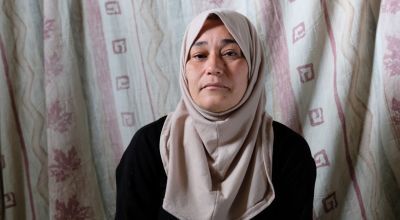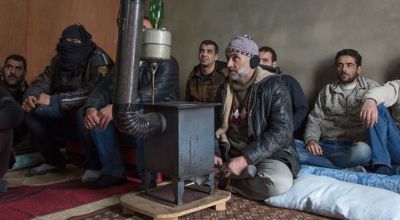
Read our 2023 annual report

Knowledge Hub
Parenting is hard. The present: A test of patience and judgement. The future: Unknown, hope and worry living side by side.
Fatima had always dreamed of providing her children with a good education, and a stable life. But conflict has pushed her dreams out of reach.
Fatima is from Syria, but lives in Lebanon with her husband and two sons. They are refugees.

The journey from Syria to Lebanon was, Fatima says, “incredibly tough and dangerous”. On arrival, their struggle continued. To survive, her children had to work instead of going to school. “They lost their innocence,” says Fatima, “and faced people who didn’t share the values we had taught them.”
Concern and the European Union
When people are forced to leave their homes, they suffer a crisis of agency and confidence, their future torn from their hands. Fatima’s mental health suffered.
She questioned the value of seeking help: “I thought, ‘how can talking make a difference?’”. Fatima believed that her problems were too much to share with others.
Her relationship with her children deteriorated. She struggled to manage her emotions. She admits: “I used to be violent with my children.”
With funding from the European Union, Concern provides psychosocial support and positive parenting programmes to Syrian refugees, stateless persons, and vulnerable Lebanese. These programmes address the social and emotional needs of struggling parents like Fatima, through sessions focusing on mental health awareness and self-care.

From “cranky manager” to supportive leader
Once Fatima was referred to Concern, life began to improve.
“The sessions turned out to be very helpful,” says Fatima. “Even one positive thought from these sessions made me feel better and gave me hope.”
The sessions provided Fatima with essential coping mechanisms that lowered her stress levels. She found it easier to engage with her children in meaningful ways; “I make quality time for them on a daily basis.”
Understanding the importance of self-care was a revelation for Fatima. “I’ve started setting aside special time for myself,” she says. “It’s important to do something I enjoy, to remain balanced.” This time includes enjoying coffee with friends, taking walks in nature, watering her plants, and taking care of her cats. These activities help her recharge during tough times.


Fatima learned effective strategies for managing her anger and improving her communication with her children. “I’m not perfect, and I still lose my temper sometimes,” she admitted, but she is committed to change; “I’m trying to manage my anger better and communicate in a positive way.”
At home, Fatima has transformed from being a “cranky manager” (in her own words) to a supportive and understanding leader. “I am proud of how I’ve improved in dealing with conflict, and managing my emotions,” she says. “Paying attention to my mental health has made me a better parent and a better person.”
Fatima wishes to raise her children to be good people who contribute to society; “I want them to be comfortable with who they are, not just with money but with themselves.”
And for herself, she hopes to learn to drive; “a step towards independence.”

Names have either been changed or withheld




